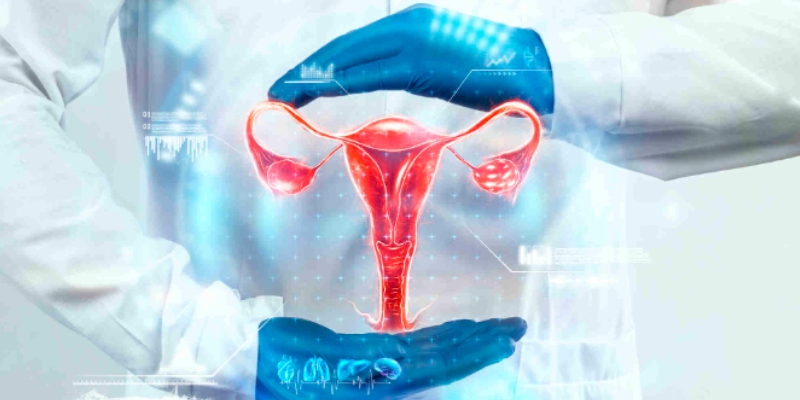Author : Dr. Babita Rajesh Chauhan
MBBS, MD(OBG)
Consultant – Obstetrician & Gynaecologis
Understanding the Menopause Journey – Embracing Change with Confidence
Menopause is not just a biological process; it’s a significant chapter in a woman’s life that merits understanding and attention, especially in the culturally rich and diverse landscape of India. As women approach their late 40s or early 50s, they embark on a journey that marks the end of their reproductive years. According to Dr. Babita Rajesh Chauhan, MBBS, MD(OBG), Consultant – Obstetrician & Gynaecologist , This phase, often shrouded in silence and stigma, needs to be discussed openly to empower women. At Motherhood Hospitals, we emphasize the importance of embracing this change with awareness and confidence. This article delves deep into the nuances of menopause in the Indian context, exploring its symptoms, the efficacy of hormone therapy, and the essentiality of a healthy lifestyle tailored for Indian women. Our aim is to guide and support women through this natural yet often misunderstood phase of life.
In India, menopause is a topic that is rarely discussed openly, leading to a lack of awareness and preparedness among many women. The journey through menopause can be bewildering without proper information and support. This article serves as a comprehensive guide, shedding light on what to expect and how to navigate the changes both physically and emotionally. With a focus on the unique aspects of Indian culture and healthcare, we aim to provide insights that resonate with the experiences of Indian women, ensuring that they do not feel alone in this journey. Understanding menopause is the first step towards managing its challenges effectively, and Motherhood Hospitals is dedicated to being a trusted partner in this journey.
Understanding Menopause
Menopause, medically defined as the cessation of menstruation for 12 consecutive months, signifies the end of a woman’s natural reproductive period. In the Indian context, the average onset of menopause is around 49 years, though it can vary widely. The perimenopausal phase, leading up to menopause, is characterized by fluctuating hormone levels, resulting in irregular menstrual cycles. This phase is crucial for Indian women, who often balance complex roles in both their personal and professional lives. Early recognition of perimenopausal symptoms enables women to seek timely advice and support, which is particularly important in a culture where such topics might be less openly discussed.
The journey to menopause is unique for every woman, but in India, it is often influenced by factors like lifestyle, diet, and genetic predispositions. Understanding these individual differences is vital in providing personalized care and support. Women may experience a range of symptoms, from hot flashes and mood swings to more subtle changes like sleep disturbances and decreasing bone density. Awareness and education about these symptoms are key to empowering Indian women to take proactive steps towards their health. At Motherhood Hospitals, we focus on providing culturally sensitive and informed care, helping women navigate this transition with knowledge and confidence. Recognizing and understanding the early signs of menopause can lead to better management of this life stage, emphasizing the importance of regular health check-ups and open conversations with healthcare professionals.
Common Symptoms and Hormone Therapy Options
Common Symptoms of Menopause in India The symptoms of menopause in Indian women can be as varied as the cultural tapestry of the country itself. Predominant symptoms include hot flashes, a feeling of intense heat that spreads over the body, often accompanied by sweating and flushing. These can be particularly challenging in the Indian climate, especially during the warmer months. Mood swings are another common symptom, manifesting as sudden tears or irritability. This emotional volatility can be perplexing not just for the women experiencing them but also for their families, necessitating a supportive and understanding environment.
In addition to these, Indian women often report sleep disturbances, which can range from insomnia to disrupted sleep patterns. Vaginal dryness and discomfort during intercourse are also noted, but these symptoms are less frequently discussed due to cultural sensitivities. It’s important to highlight that these changes are natural and manageable with the right approach. The varied diet and lifestyle across different regions of India can also influence the intensity and nature of these symptoms. Therefore, a personalized approach to symptom management, acknowledging these cultural and regional differences, is crucial in providing effective care at Motherhood Hospitals.
Hormone Therapy Options in India
Hormone therapy (HT) is a significant medical intervention for managing menopause symptoms in India, offering relief from hot flashes, night sweats, and vaginal dryness. However, it’s not a one-size-fits-all solution. The decision to use hormone therapy must be made on an individual basis, considering the woman’s health history, severity of symptoms, and personal preferences. Indian women, like their counterparts globally, must weigh the benefits against the potential risks, such as a slightly increased risk of certain diseases when using HT for prolonged periods.
In the Indian healthcare context, the availability of hormone therapy and the awareness of its benefits and risks vary. At Motherhood Hospitals, our approach is to provide comprehensive information, allowing women to make informed decisions about their health. We discuss the types of hormone therapies available, including systemic estrogen, which is the most effective treatment for menopausal symptoms, and low-dose vaginal products for localized symptoms. Alternative and complementary therapies are also gaining popularity in India, with many women seeking natural or plant-based remedies. It’s vital to discuss these options with healthcare professionals to understand their efficacy and safety.
Healthy Lifestyle Choices and The Role of Self-Care
Healthy Lifestyle Choices During Menopause Adopting a healthy lifestyle is paramount for Indian women navigating the menopausal transition. A balanced diet, rich in calcium and vitamin D, is essential for bone health, as menopause increases the risk of osteoporosis. Indian diets, traditionally rich in vegetables and grains, can be optimized by including more leafy greens, dairy products, and foods fortified with calcium and vitamin D. Regular physical activity is another cornerstone of a healthy menopausal journey. Exercises such as yoga, which is deeply rooted in Indian culture, not only help in maintaining a healthy weight but also reduce stress and improve mood, countering some of the psychological symptoms of menopause.
Another aspect of a healthy lifestyle is stress management, particularly crucial in the fast-paced life many Indian women lead. Practices like meditation, mindfulness, and deep breathing exercises can be immensely beneficial. In addition, getting adequate sleep is vital for overall well-being. Sleep disturbances, common during menopause, can be mitigated through good sleep hygiene practices like maintaining a regular sleep schedule and creating a comfortable sleep environment. At Motherhood Hospitals, we emphasize the importance of these lifestyle modifications, offering guidance tailored to the unique needs of Indian women during this transitional phase.
The Role of Self-Care and Support
Self-care during menopause goes beyond physical health; it encompasses emotional and mental well-being. For Indian women, this might mean taking time out for themselves, engaging in activities they enjoy, or simply resting. It’s a time to prioritize their own health and needs, often a challenging task in a culture where women are accustomed to putting their family’s needs first. Emotional support from family, friends, and peers who are going through similar experiences can be incredibly valuable. Sharing experiences and coping strategies can help in normalizing the menopause transition and reducing feelings of isolation.
Moreover, professional support from healthcare providers is crucial. At Motherhood Hospitals, we offer counseling and support groups where women can discuss their concerns and learn from the experiences of others. These forums provide a safe space to talk about sensitive issues like sexual health and emotional changes, which are often not discussed openly in Indian society. Empathy, understanding, and informed guidance from healthcare professionals can make a significant difference in how women experience and manage menopause. By fostering an environment of care and support, we aim to empower women to embrace this phase of life with confidence and positivity.
Motherhood Hospitals: A Partner in the Menopause Journey
At Motherhood Hospitals, we understand the multifaceted challenges Indian women face during menopause. Our commitment is to provide a holistic approach to menopausal care, combining medical expertise with empathetic support. We offer a range of services tailored to the needs of menopausal women, including specialized health check-ups, hormone therapy consultations, and dietary advice. Recognizing the importance of mental and emotional well-being, we also provide counseling services and support groups, facilitating a supportive community for women undergoing similar experiences.
Our approach is grounded in the understanding that menopause is not merely a medical condition but a significant life transition. Therefore, we emphasize education and awareness, empowering women with the knowledge they need to navigate this phase confidently. From understanding the physiological changes to managing symptoms effectively, our healthcare professionals are dedicated to providing personalized care. We also encourage women to participate actively in their health decisions, fostering a sense of control and positivity towards the menopause journey. At Motherhood Hospitals, we stand as a trusted ally, guiding women through this transition with care, respect, and expertise.
Embracing menopause with confidence is a journey of self-discovery and adaptation. This transition, while challenging, offers an opportunity for women to focus on their health and well-being in new ways. Through this article, we have explored the various facets of menopause in the Indian context, highlighting the importance of understanding symptoms, exploring treatment options like hormone therapy, adopting healthy lifestyle choices, and the indispensable role of self-care and support.
At Motherhood Hospitals, we are committed to supporting women through every stage of this journey. We believe that with the right information, care, and support, menopause can be a phase of life approached with assurance and positivity. As women in India and around the world navigate this natural transition, it is our hope that they do so with an empowered and informed perspective, embracing the change as an integral part of the extraordinary journey of womanhood.
Dr. Babita Rajesh Chauhan will respond to your query as soon as possible. For emergencies please call and reach Motherhood Hospital, Mohali.
At Motherhood Hospitals, we have a team of experienced supers specialists backed by the latest infrastructure and facilities. We have the best gynecologist in Mohali. We are experts in handling complex deliveries, gynecological, and other surgeries including a range of laparoscopic surgeries.
Do take an appointment with the best woman care hospital in Mohali at a center closest to you. Meet with our doctors who will carry out the required investigations, diagnose the issue and recommend the most appropriate treatment, enabling you to lead an active life.
If you wish to get in touch with Dr. Babita Rajesh Chauhan, please book your appointment here.


 Toll Free Number
Toll Free Number
















